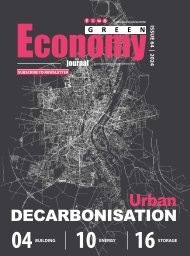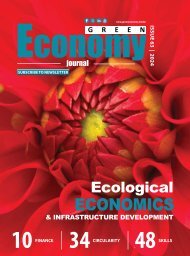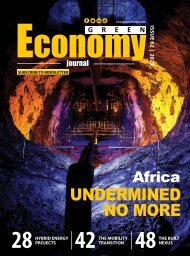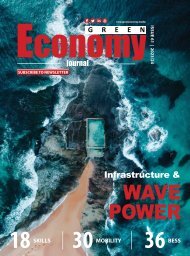Green Economy Journal Issue 60
Create successful ePaper yourself
Turn your PDF publications into a flip-book with our unique Google optimized e-Paper software.
ENERGY<br />
ENERGY<br />
WINDS OF CHANGE<br />
Empowering South Africa’s renewable<br />
energy workforce<br />
South Africa’s wind energy sector has rapidly expanded, cementing its place on the global<br />
renewable energy stage. However, this growth has unveiled a significant challenge: a widening<br />
skills gap within the industry.<br />
Energy and Water Sector Education and Training Authority<br />
(EWSETA) and the South African Wind Energy Association<br />
(SAWEA) have collaborated to explore how addressing the<br />
operational skills and qualification gap will advance wind energy<br />
in South Africa and contribute to the nation’s climate goals.<br />
The skills gap challenge<br />
The surge in wind energy projects across South Africa has created an<br />
increased demand for skilled professionals. This demand encompasses<br />
a wide array of expertise, ranging from engineers and technicians<br />
to project developers and environmental specialists. Unfortunately,<br />
there are insufficient skills to meet the demand in the South African<br />
context. Currently, the actual challenge is that there are not enough<br />
skilled and experienced workforce.<br />
Several factors contribute to this skills gap, including the historical focus on<br />
coal in the energy sector, insufficient wind energy qualifications and skills<br />
development providers as well as a shortage of experienced professionals<br />
in the field. These factors have led to a shortage of skilled workers capable<br />
of supporting the growth of renewable energy in South Africa.<br />
Opportunities abound<br />
Despite the challenges posed by the skills gap, it presents a unique<br />
opportunity for South Africa to cultivate a workforce capable of driving<br />
the wind energy sector forward. Initiatives aimed at closing this gap<br />
have the potential to offer substantial benefits to the nation’s economy<br />
and its transition to a sustainable energy future.<br />
A promising avenue to address this challenge is the collaboration<br />
between EWSETA and SAWEA. EWSETA, which is responsible for skills<br />
development in the energy and water sectors, has partnered with<br />
SAWEA to create tailored training programs and apprenticeships<br />
designed to meet the specific needs of the wind energy industry.<br />
These programs encompass a wide range of skills, spanning installation<br />
and maintenance to project development and management.<br />
Empowering women and youth<br />
South Africa must empower women and youth by actively involving<br />
them in the wind energy sector. Encouraging their participation<br />
addresses gender and youth unemployment disparities and fosters<br />
diversity and innovation within the industry.<br />
SAWEA and EWSETA have already taken significant steps in this<br />
direction by launching the Renewable Energy Management<br />
Advancement Programme aimed at advancing women to middle –<br />
senior management positions in the sector through Wits Business<br />
School. The intervention seeks to transform the sector and address<br />
gender disparity. In addition, the partnership in the Wind Industry<br />
Internship Programme which is currently in its second year provides<br />
work experience to young graduates who are interested in pursuing<br />
careers in wind energy. This initiative was successful through the<br />
participation of the employers who have opened their workplaces<br />
to enable this mentorship initiative. These initiatives provide access<br />
to education and hands-on experience, paving the way for a more<br />
inclusive and dynamic workforce.<br />
To advance wind energy in South<br />
Africa, it is imperative to invest in training<br />
and development programmes that<br />
produce highly skilled operational<br />
technicians and engineers.<br />
Companies operating in the wind energy sector must play a pivotal<br />
role by actively promoting diversity and inclusion, dismantling barriers<br />
and fostering a welcoming environment for all.<br />
“A collaborative approach is essential, bringing together government,<br />
industry and training providers to establish effective training capacity<br />
for renewable energy. Traditional market-driven strategies may not<br />
be suitable for this context. It’s also crucial to construct pathways for<br />
training and employment that cater to a diverse labour force, including<br />
marginalised groups outside the workforce. Furthermore, a holistic<br />
perspective should be adopted, treating renewable energy as part<br />
of an interconnected workforce “ecosystem” that enables seamless<br />
transitions between renewable energy and adjacent sectors like<br />
resources, infrastructure and manufacturing, says Khetsiwe Mtiyane,<br />
EWSETA’s Energy Specialist.<br />
Value-chain skills gap: advancing wind energy<br />
While the skills gap mentioned earlier relates to the development<br />
and construction phases of wind energy projects, addressing the<br />
operational skills gap is equally crucial. Skilled workers are needed to<br />
ensure the efficient and reliable operation of wind farms.<br />
operational technicians and engineers. These professionals play<br />
a pivotal role in maximising the energy output of wind farms and<br />
ensuring their long-term sustainability.<br />
As South Africa’s wind energy sector continues to expand, the skills gap<br />
poses a multifaceted challenge that must be addressed strategically.<br />
Collaboration between EWSETA and SAWEA is a promising step in<br />
the right direction. By developing tailored training programmes and<br />
apprenticeships, the nation can equip its workforce with the skills<br />
needed to support the growth of renewable energy.<br />
It is essential for the efficient and reliable operation of wind farms,<br />
which contributes to South Africa’s climate goals and the long-term<br />
success of its wind energy sector. By seizing the opportunities presented<br />
by these skills gaps, the nation can unlock its wind energy potential<br />
and contribute to a sustainable and prosperous future. The rewards<br />
for achieving these goals extend far beyond emissions reduction,<br />
encompassing economic growth, energy security and a cleaner, more<br />
sustainable future.<br />
Operational skills encompass areas such as maintenance, troubleshooting<br />
and performance optimisation. Without a well-trained operational<br />
workforce, wind farms can suffer from downtime, reduced efficiency<br />
and increased operational costs.<br />
To advance wind energy in South Africa, it is imperative to invest in<br />
training and development programmes that produce highly skilled<br />
10 11

















